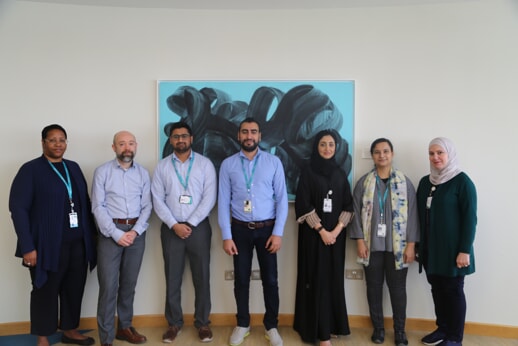Note that the attached group photo was taken in early March before social and physical distancing measures were put in place in Qatar.
A cutting-edge immunodeficiency discovery involving Sidra Medicine, a QF entity, has been published in the New England Journal of Medicine (NEJM), a leading peer-reviewed medical journal.
The paper was part of a study, which focused on a previously healthy adult who succumbed to a cytomegalovirus (CMV) infection due to a mutation in a gene called NOS2. The case highlighted an important link between the NOS2 gene and increased susceptibility to lethal CMV infection.
CMV is one of several human herpes viruses transmitted by bodily fluids and commonly found throughout the world. The infection often occurs during childhood but typically does not cause disease. Also, healthy people are generally able to maintain sufficient anti-CMV immunity to stop it from becoming lethal.
Led by Dr. Jean-Laurent Casanova of The Rockefeller University, the study included among others Dr. Nico Marr, Principal Investigator, and group leader of the Systems Immunology and Immune Deficiency laboratory at Sidra Medicine.
Dr. Nico Mar noted: "The discovery is unexpected and important. Knowledge about naturally occurring mutations that predispose children and adults to potentially fatal CMV infection is important from a clinical point of view".
"We believe that severe infectious diseases are caused not only by the virulent nature of an infectious agent but that our genes can also play a role. Our research laboratory at Sidra Medicine uses a variety of state-of-the-art technologies to generate additional biological data for patients with severe and life-threatening infections, better positioning us to find and study disease-causing mutations, particularly in pediatric patients. Our group contributed to this case study by performing large-scale antibody profiling using Phage Immunoprecipitation-Sequencing, established in collaboration with Brigham and Women's Hospital, Boston, and supported by Qatar National Research Fund." continued Dr. Marr.
"Innovative investigations like these require a collaborative effort and a multidisciplinary group, as we are essentially describing new diseases with each new inborn error of immunity. Dr. Casanova is one of the leading pioneers in this particular field, and his group's work has led to a paradigm shift about how we understand infectious diseases. We are confident our joint efforts can improve healthcare, particularly for children," concluded Dr. Marr.
In addition to Dr. Marr, members of the Sidra Medicine research team, who contributed to this study include Dr. Mahbuba Rahman, Dr. Taushif Khan and Ms. Fatima Al Ali. They are working closely with several doctors from Sidra Medicine's clinical and pathology teams and actively collaborating with Dr. Casanova's group and other international researchers on several other unsolved cases. The focus of these investigations is to identify and dissect the molecular and immunological consequences of naturally occurring mutations in patients that have an immune deficiency disorder.
Dr. Khalid Fakhro, Acting Chief Research Officer at Sidra Medicine said: "The current study is an example of an outstanding team effort from Dr. Marr and his collaborators, who are investigating patients with immunodeficiency – a genetic condition where the immune system is impaired and patients become highly susceptible to recurrent and often severe infections. The publication of this study in the New England Journal of Medicine, one which has a high impact factor1, is a testament to the quality of research at Sidra Medicine, which not only improves our understanding and treatment of patients with complex diseases, but also demonstrate that our discoveries are of relevance to a global audience. In the coming years, we are aiming for even deeper integration between research and clinic at Sidra Medicine, which will usher in an era of Precision Medicine for the hospital and for Qatar."


